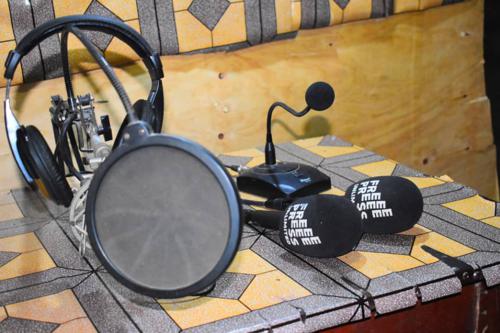Equipment from Radio Tempête du Lac, a radio relaying major editions of Radio Okapi newspapers in the lakeside town of Kasenyi. Ituri, May 2023
Radio Okapi.Ph/ Marc Maro Fimbo”/>
The world celebrates this Wednesday, May 3, the 30th anniversary of World Press Freedom Day, under the theme: ”Press freedom as a driver of all other human rights in the DRC”. The debate revolves around the capacity of the State to take up the challenge of “media salubrity”.
This celebration comes after the promulgation, by the Head of State last March, of the new press law.
During the states-general of communication and the media, President Félix Tshisekedi recommended more “media safety” in the DRC. According to the Minister of Communication and Media, Patrick Muyaya, the new law marks the first step towards this safety.
“Anyone who wants to be a journalist is no longer a journalist, the law thus reinforces the conditions of access to the profession”, he underlines.
In fact, article 3 of this law defines who is a professional journalist in point 11 and who is a media professional in point 20. Moreover, under article 42, any natural or legal person can set up a press. It would still have to respect the law which provides for several conditions in its article 43.
Professor Claude Mukeba welcomes this, while putting the State before its responsibilities:
“When we reinforce the conditions of access to the profession, we will logically get rid of what we can consider as riddles. Those who don’t have quality can’t come, we will still have solved a small problem in terms of safety. Beyond the text that is presented, what is the capacity of the State or the public power to compel people to do so in an environment where the media are created every day and by anyone? »
As for the question of the decriminalization of press offences, force remained with the law. But, for Cyrille Milandu, journalist at Top Congo, the responsibility lies with the journalist:
“When you read the online press, the written press, the audiovisual media, there is always a slippage. I think we have to be professional by respecting the rules of our profession”.
The High Council for Audiovisual and Communication (CSAC) is now there to regulate everything.
